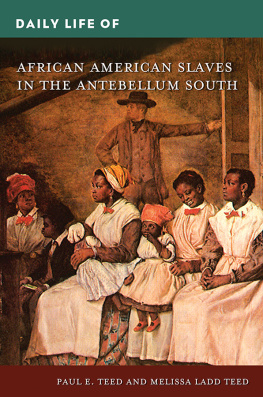Faust - The ideology of slavery: proslavery thought in the antebellum South, 1830-1860
Here you can read online Faust - The ideology of slavery: proslavery thought in the antebellum South, 1830-1860 full text of the book (entire story) in english for free. Download pdf and epub, get meaning, cover and reviews about this ebook. City: Baton Rouge;USA, year: 1999;1981, publisher: Louisiana State University Press, genre: Science. Description of the work, (preface) as well as reviews are available. Best literature library LitArk.com created for fans of good reading and offers a wide selection of genres:
Romance novel
Science fiction
Adventure
Detective
Science
History
Home and family
Prose
Art
Politics
Computer
Non-fiction
Religion
Business
Children
Humor
Choose a favorite category and find really read worthwhile books. Enjoy immersion in the world of imagination, feel the emotions of the characters or learn something new for yourself, make an fascinating discovery.

- Book:The ideology of slavery: proslavery thought in the antebellum South, 1830-1860
- Author:
- Publisher:Louisiana State University Press
- Genre:
- Year:1999;1981
- City:Baton Rouge;USA
- Rating:5 / 5
- Favourites:Add to favourites
- Your mark:
- 100
- 1
- 2
- 3
- 4
- 5
The ideology of slavery: proslavery thought in the antebellum South, 1830-1860: summary, description and annotation
We offer to read an annotation, description, summary or preface (depends on what the author of the book "The ideology of slavery: proslavery thought in the antebellum South, 1830-1860" wrote himself). If you haven't found the necessary information about the book — write in the comments, we will try to find it.
Faust: author's other books
Who wrote The ideology of slavery: proslavery thought in the antebellum South, 1830-1860? Find out the surname, the name of the author of the book and a list of all author's works by series.
The ideology of slavery: proslavery thought in the antebellum South, 1830-1860 — read online for free the complete book (whole text) full work
Below is the text of the book, divided by pages. System saving the place of the last page read, allows you to conveniently read the book "The ideology of slavery: proslavery thought in the antebellum South, 1830-1860" online for free, without having to search again every time where you left off. Put a bookmark, and you can go to the page where you finished reading at any time.
Font size:
Interval:
Bookmark:
Library of Southern Civilization
Lewis P. Simpson, Editor
THE IDEOLOGY OF SLAVERY
Proslavery Thought in the Antebellum South, 18301860
Edited, with an Introduction, by DREW GILPIN FAUST
Louisiana State University Press, Baton Rouge
Published by Louisiana State University Press
Copyright 1981 by Louisiana State University Press
All rights reserved
Manufactured in the United States of America
Designer: Patricia Douglas Crowder
Typeface: Linotron 202 Sabon
Typesetter: G&S Typesetters, Inc.
LIBRARY OF CONGRESS CATALOGING IN PUBLICATION DATA
The Ideology of slavery.
(Library of Southern civilization)
Bibliography: p.
Contents: Abolition of Negro slavery / Thomas Roderick DewMemoir on slavery / William HarperA brief examination of scripture testimony on the institution of slavery / Thornton Stringfellow[etc.]
1. SlaverySouthern StatesHistorySources. 2. Southern StatesHistory17751865Sources. 3. Afro-AmericansHistoryTo 1863Sources. I. Faust, Drew Gilpin. II. Series. E449.126 975.00496073 81-3755
ISBN-13: 978-0-8071-0892-5 (pbk.)
The paper in this book meets the guidelines for permanence and durability of the Committee on Production Guidelines for Book Longevity of the Council on Library Resources. 
INTRODUCTION
The Proslavery Argument in History
I. THOMAS RODERICK DEW
Abolition of Negro Slavery
II. WILLIAM HARPER
Memoir on Slavery
III. THORNTON STRINGFELLOW
A Brief Examination of Scripture Testimony on the Institution of Slavery
IV. JAMES HENRY HAMMOND
Letter to an English Abolitionist
V. JOSIAH C. NOTT
Two Lectures on the Natural History of the Caucasian and Negro Races
VI. HENRY HUGHES
Treatise on Sociology
VII. GEORGE FITZHUGH
Southern Thought
The pages that follow attempt to portray the development, mature essence, and ultimate fragmentation of proslavery thought during the era of its greatest importance in the American South. Although recent years have witnessed an intensification of interest in the antebellum defense of slavery, students and scholars have not had convenient access to texts that could provide a basis for serious study of the proslavery argument. I have tried here to place some of the most significant nineteenth-century proslavery writings within a framework of twentieth-century scholarly understanding by providing an introduction, head notes, and a bibliography of relevant secondary material.
The introduction establishes a context for the selections that follow by presenting both a history of the defense of slavery and a historiographical survey of writing on proslavery thought. The texts themselves have been reproduced with a minimum of abridgement, although some editing was necessary to make a one-volume anthology feasible. For the most part, I restricted my omissions to eliminating some of the interminable examples these nineteenth-century authors liked to offer in support of each assertion within their arguments. In several cases, I chose to include lesser-known works by standard authors because these could be reproduced without substantial editorial intervention. I felt that, insofar as possible, I should allow slaverys defenders to speak for themselves. Original spelling and punctuation, even when inconsistent, have been retained. The Selected Bibliography that closes the volume is designed to serve as a comprehensive guide to the historical literature on the proslavery theorists and their arguments.
I have been aided in compiling this anthology by a variety of scholars and friends. Peter Kolchin, Larry Tise, and Bertram Wyatt-Brown generously provided me access to their unpublished work. Lewis Simpson and Beverly Jarrett of Louisiana State University Press had the idea for the volume in the first place, and helped shape the book with clear-headed and useful suggestions. Carolyn Kappes, Margaret Fisher Dalrymple, Marlene Heck, and Janet Tighe worked hard to keep the text free from error. Charles Rosenberg and Paul and Barbara Rosenkrantz set a scholarly tone that inspired me to come home from the beach and finish the project. To all I am grateful.
THE IDEOLOGY OF SLAVERY
The controversy over slavery in the antebellum United States did not end with abolition of the Souths peculiar institution. In the century that has followed Appomattox, historians have debated the sources and meaning of the slavery agitation nearly as vigorously as early nineteenth-century Americans argued about human bondage itself. But a disproportionate amount of this scholarly attention has been devoted to antislavery movements and ideologies. Whereas studies of abolitionism have established it as both a product and an index of fundamental aspects of nineteenth-century culture, historical treatment of proslavery has emphasized its aberrant qualities, identifying it as the evanescent product of the unique civilization that flourished in the South during the last three decades before the Civil War. Many scholars have felt uncomfortable contending with zealous defenses of a social system that the twentieth century judges abhorrent, and, like David Donald, they have found the proslavery movement astonishing.
In recent years, however, interpretations of proslavery thought have shifted. Perhaps more accustomed to the notion of a timeless and geographically extensive American racism, scholars have begun to place proslavery within a wider context, to regard it as more than simply a distasteful manifestation of a collective paranoia gripping the South in the years before the Civil War. Historians have come to view the proslavery argument less as evidence of moral failure and more as a key to wider patterns of beliefs and values. The defense of human bondage, they recognize, was perhaps more important as an effort to construct a coherent southern social philosophy than as a political weapon of short-lived usefulness during the height of sectional conflict. In defending what they repeatedly referred to as the cornerstone of their social order, slaverys apologists were offering posterity an unusual opportunity to examine the world view of articulate southerners, their sources of social legitimation, and their self-conscious definition of themselves.
A significant aspect of the reorientation of modern scholarship toward a widening interpretation of proslaverys significance has been a growing interest in its persistence over time. Although a few scholars of the 1930s and 1940s noted proslaverys early origins,
Recent work, however, has revised this chronology, exploring in new detail the significance of proslavery doctrines during the colonial period.
This broadened chronology and geography of proslavery contains important implications for the understanding of the movement and of the Old South itself. Some scholars in the past have tended to regard the defense of slavery as a product of southern guilt, an effort by slaveholders to assuage consciences riddled with shame about violations of Americas democratic creed. Recent attention to the colonial origins and wide extension of pro-slavery views suggests the existence of a strong alternative tradition of social and even moral legitimation upon which antebellum southerners might draw. Less philosophically and morally isolated than Charles Sellers and W. J. Cash would have us think, southerners may have felt far less guilty and ambivalent as well.
But emphasis on the extensiveness of proslavery thought through time and space has not diminished scholarly interest in the role of the argument in the South during the last three decades of the antebellum period. Even historians insisting upon its early origins and wide diffusion recognize its increased significance in these years. During this era, the slavery controversy not only became a matter of survival for the southern way of life; it served for Americans generally as a means of reassessing the profoundest assumptions on which their world was built.
Next pageFont size:
Interval:
Bookmark:
Similar books «The ideology of slavery: proslavery thought in the antebellum South, 1830-1860»
Look at similar books to The ideology of slavery: proslavery thought in the antebellum South, 1830-1860. We have selected literature similar in name and meaning in the hope of providing readers with more options to find new, interesting, not yet read works.
Discussion, reviews of the book The ideology of slavery: proslavery thought in the antebellum South, 1830-1860 and just readers' own opinions. Leave your comments, write what you think about the work, its meaning or the main characters. Specify what exactly you liked and what you didn't like, and why you think so.


